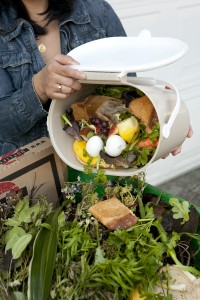City Council approves ordinance to expand citywide composting program
Chronicle Media — August 2, 2015
February 17, 2010- Portland, OR- Green yard debris roll carts and a new compost pail for the launch of the City of Portland Bureau of Planning & Sustainability’s food scrap collection program for residents.
Ordinance Expands Allowable Compostable Materials for Community Gardens and Urban Farms
The City Council last week approved Mayor Rahm Emanuel’s ordinance to expand composting operations at community gardens and urban farms across Chicago, as well as create a citywide community garden registry and urban farm accessory composting operation permit.
The goal of the program is to expand the type of allowable compostable materials at both community gardens and urban farms, while implementing common sense measures to ensure public health standards are maintained.
“Urban agriculture is an important piece in making our communities more environmentally friendly and sustainable,” said Emanuel. “Expanding composting is an easy way to support our neighborhoods in growing their own fresh fruits and vegetables right in their own back yards.”
In addition to landscape waste, such as grass or shrubbery clippings, community gardens will now be allowed to compost limited organic waste, including food scraps such as vegetables and eggshells. All community gardens will be required to register with the City at no cost through a new online community garden registry. The ordinance also creates a new Urban Farm Accessory Composting Operation Permit, which will allow urban farms to apply for a permit with the Chicago Department of Public Health to compost livestock waste, in addition to landscape and limited organic waste.
“Composting supports the reuse of material that would otherwise be considered waste and sent to landfills,” said Commissioner Julie Morita, Chicago Department of Public Health. “I look forward to implementing these new policies and other best practices with our community stakeholders in the upcoming composting season.”
The ordinance was drafted with input from local urban agriculture and environmental stakeholders and the City will continue to work with these partners as the community is educated about new composting opportunities.
“We applaud Mayor Emanuel for introducing this ordinance, created with feedback from advocates and cooperative work with City departments,” said Jen Walling, Executive Director, Illinois Environmental Council. “This ordinance positions Chicago as one of the top cities in the nation for small scale composting sites, protecting the environment and introducing new tools for urban farmers and gardeners.”
Expanding composting is part of a larger strategy to support urban agriculture efforts in Chicago. In 2011, Emanuel passed the Urban Farm ordinance, expanding the size limit on community gardens, relaxing fencing and parking requirements on commercial urban farms to help reduce startup costs, and allowing for innovative new methods of farming such as hydroponic and aquaponic systems. Over the last four years, acreage devoted to urban farming has increased by a factor of 13, going from 1.4 acres to roughly 18 acres, and the number of urban farm operators from two to 13.
— City Council approves ordinance to expand citywide composting program —







